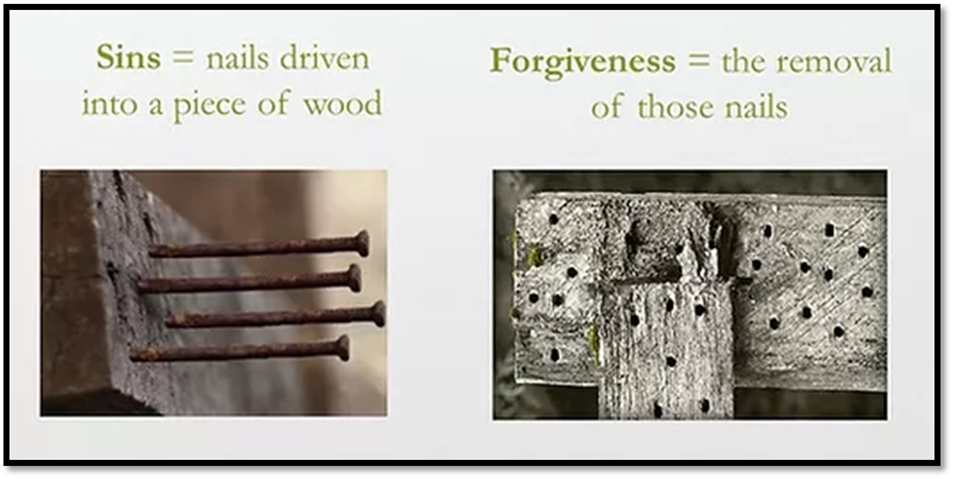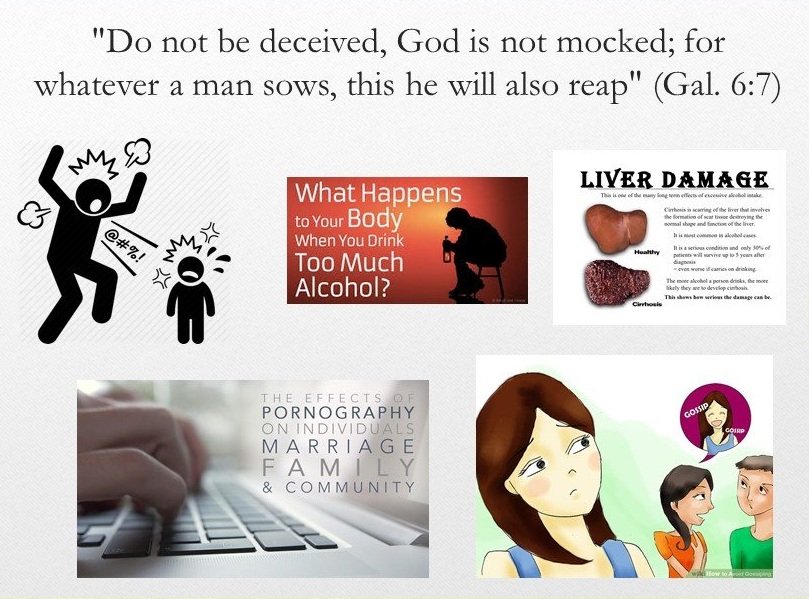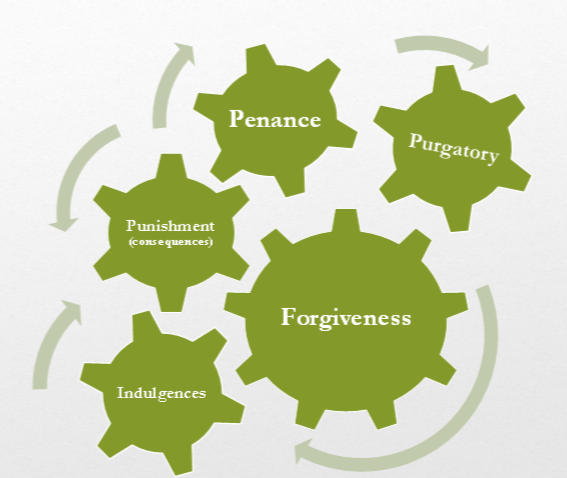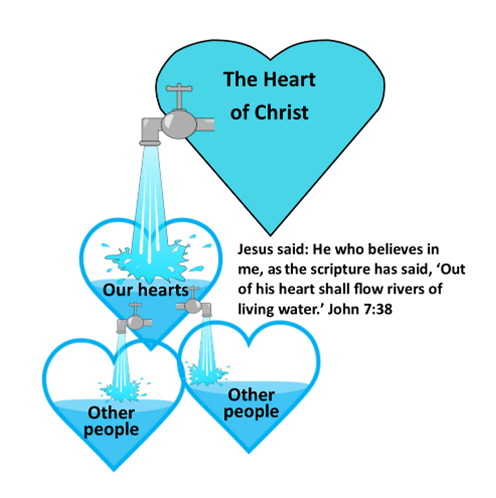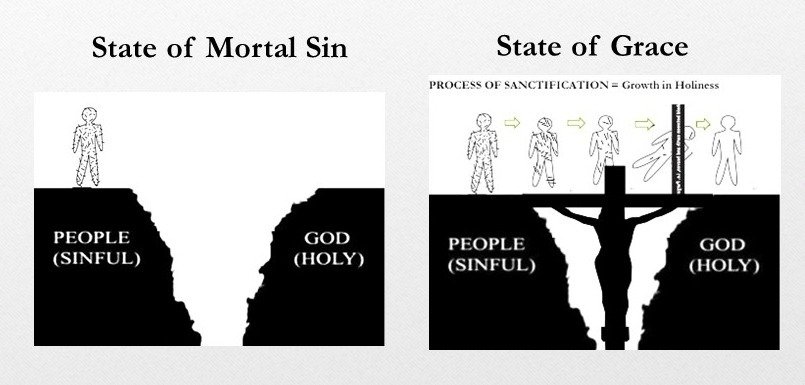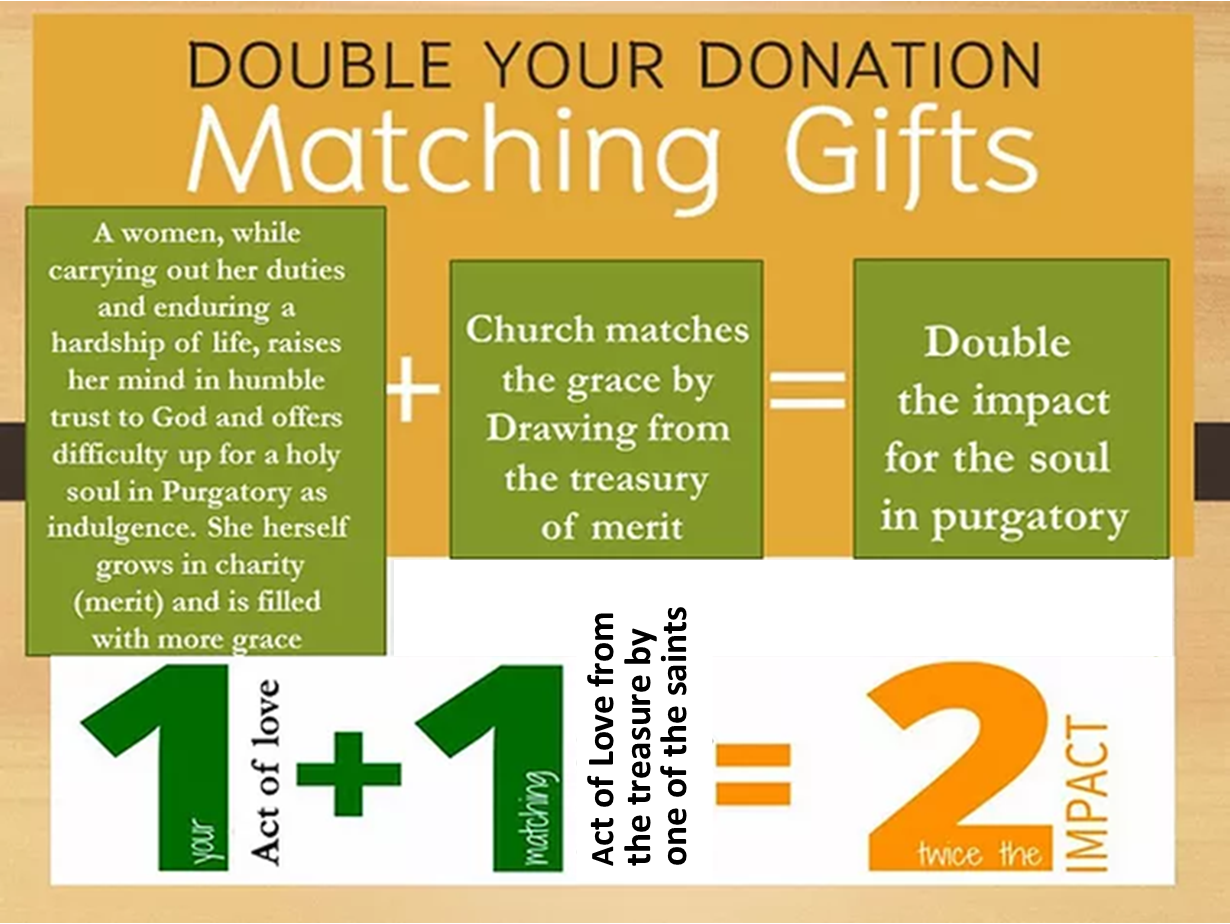Indulgences - Double Your Gift
The term “indulgences” refers to specific prayers and actions, permeated with a spirit of penance, that are an extra-special channel of God’s superabundant, healing grace. Once a person has truly repented of his sins and, if necessary, received forgiveness from Christ through the Sacrament of Reconciliation (this is called “absolution”), indulgences help to further the healing process that is needed for himself or for a Holy Soul in Purgatory and for the people that have been hurt by his/her sins.
Two-fold Consequence (i.e. Punishment)* of Sin
*Before we get started, please know that the Church uses the words consequence and punishment interchangeably here because in this case, the natural consequences of sin are, in fact, a punishment that naturally flows from sin. There are negative effects set in motion every time we sin but the effects can be greater and much more intense depending on whether the sin is mortal or venial.
(Some of the following is taken from this excellent article )
In order to come to grips with the Church’s teaching on indulgences, one must first understand the Catholic teaching on the two-fold punishment of sin: namely, the eternal and the temporal.
The eternal punishment of sin refers to hell, the permanent separation from God by persisting in a state of unrepentant mortal sin. Thus, the eternal aspect refers to whether or not we are forgiven.
The temporal punishment of sin, on the other hand, refers to the way in which our sins wound us and others.
God wants not only to forgive our sins, but to heal and transform us.
If we were to imagine our sins as nails driven into a piece of wood, and forgiveness as the removal of those nails, we would still be left with holes in the wood where the nails previously were.
In other words, the work of God is not complete upon mere forgiveness, but seeks to go further through healing and transformation accomplished by our cooperation with supernatural grace through penance and indulgences (i.e. filling in the holes of the wood).
In this light, the Catechism of the Catholic Church (CCC) explains:
“These two punishments [eternal and temporal] must not be conceived of as a kind of vengeance inflicted by God from without, but as following from the very nature of sin” (CCC, 1472).”
We know this is true because we see the temporal consequences of sin everywhere. Even after we have repented of our sins and received forgiveness it is still obvious that further healing is necessary, not only for ourselves but also for the people we have hurt by our sins.
“For the one who sows to his own flesh will from the flesh reap corruption” (Galatians 6:8).
Forgiveness and temporal punishment/consequences are not opposite ends of a spectrum. They are two sides of the same coin. Together, they establish an essential part of the Lord's plan for believers.
Forgiveness is relational. It puts us back into a right relationship with someone. The Father sent Jesus to make a sacrifice on our behalf, and by so doing reconciled us to Himself. By His mercy alone, we can repent of our sins, be forgiven and have communion with the Lord.
On the other hand, consequences are circumstantial. Often God does not remove consequences simply because we trust Christ as Savior or confess sin. He leaves them in place for us to struggle with and to grow from for many important reasons. Here are three:
to learn from our mistakes;
in order to fortify us for future temptations because when we experience the consequences or realize there is a punishment accrued, it makes it easier to resist future temptations.
to grow in humility and empathy for others.
etc.
God gives a punishment because He not only wants to forgive us, but to heal and transform us completely, not merely superficially. He wants to heal us from the inside out, not just cover over our sins like a snow white blanket over a pile of dung.
We do this as parents. When our children get in trouble, and they say they’re sorry, we respond both with forgiveness and their punishment.
The punishment is not for them to earn our forgiveness back, but to redress the disorder wrought in their souls by the wrongdoing.
In Hebrews 12:6-11 we read:
My son, neglect not the discipline of the Lord; neither be thou wearied whilst thou art rebuked by him. 6 For whom the Lord loveth, he chastiseth; and he scourgeth every son whom he receiveth. 7 Persevere under discipline. God dealeth with you as with his sons; for what son is there, whom the father doth not correct? 8 But if you be without chastisement, whereof all are made partakers, then are you bastards, and not sons. 9 Moreover we have had fathers of our flesh, for instructors, and we reverenced them: shall we not much more obey the Father of spirits, and live? 10 And they indeed for a few days, according to their own pleasure, instructed us: but he, for our profit, that we might receive his sanctification. 11 Now all chastisement for the present indeed seemeth not to bring with it joy, but sorrow: but afterwards it will yield, to them that are exercised by it, the most peaceable fruit of justice.
It’s precisely because we believe in this dual consequence of sin (eternal and temporal) that we: do penance, believe in purgatory, and embrace the doctrine of indulgences.
Penance
There is a perennial temptation, once we have sinned and repented, to merely sigh sorrowfully without mending our ways but scripture says,
“Bear fruit that befits repentance” (Matthew 3:8).
The good news is that the principle of reaping and sowing works in a positive way as well. We can sow good seeds that will turn negative situations into positive ones through penance and indulgences
"The one who sows to the Spirit will from the Spirit reap eternal life" (Gal. 6:8).
So, what is Penance?
Penance, in the sense it is being used here, is an act of self-denial or devotion performed voluntarily to show sorrow for a sin or other wrongdoing in an attempt to remedy the negative consequences. Penance is, first and foremost, retribution for wrongdoing such as returning stolen goods, trying to restore a person’s reputation that we have damaged through detraction, calumny or slander, kind acts to a person we have hurt, etc. – this will be different for each person and each sin. As we do all we can to repair the damage we have caused, we precede, accompany and follow those actions with prayer, fasting and/or almsgiving. Penance, as understood in this way, is a channel of God's grace for the purpose of our own transformation and for the healing the temporal consequences of sins in ourselves and the people affected by our sins.
CCC 1450 – The Acts of the Penitent are Endurance, Contrition, Confession, Humility and Fruitful Satisfaction.
We are the penitent and the “acts of endurance, contrition, confession, humility and fruitful satisfaction” are referring to what we have to bring with us (the disposition of our heart and will) to the Sacrament of Reconciliation in order for it to be a valid confession (this also goes for acts of repentance made outside of the Sacrament of Reconciliation). More than likely we know and understand the need for endurance (to endure all things - temporal consequences - willingly), contrition (true sorrow of the soul and detestation for the sin committed, together with the resolution not to sin again), and confession (the act of confessing our sins) and humility but we might not know and understand what satisfaction is.
So, what is satisfaction?
Catechism of the Catholic Church
CCC 1459 SATISFATION DEFINED:
“Many sins wrong our neighbor. One must do what is possible in order to repair the harm (e.g. return stolen goods, restore the reputation of someone slandered, pay compensation for injuries). Simple justice requires as much.
But sin also injures and weakens the sinner himself, as well as his relationships with God and neighbor.
Absolution takes away sin, but it does not remedy all the disorders sin has caused.
Raised up from sin, the sinner must still recover his full spiritual health by doing something more to make amends for the sin: he must "make satisfaction for" or "expiate" his sins. This satisfaction is also called "penance."
Furthermore, penance can be considered a "win/win/win" because it not only helps the person doing it, and the people who have been hurt by our sins, but can also be offered as a prayer of intercession for others not directly involved. For example, the difficulty or inconvenience involved in making amends can be offered to God as a prayer for healing the person hurt by our sins and for the conversion of other sinners or family members.
Purgatory
This is where Purgatory comes in. Purgatory is not a second chance or a middle ground. Rather, purgatory is for those who die in friendship with God (i.e. the eternal consequence of sin has been dealt with because they have authentically repented), but are not yet completely purified (i.e. some of the temporal consequences/punishment of sin remains).
God begins his work of transformation in us now and he provides every opportunity to make amends for our sins and every grace we need to grow in this life; if, however, we do not cooperate with His grace and, upon death, this healing is left incomplete, He will complete it in a state called “purgatory (see CCC - Catechism of the Catholic Church, 1030, 1054).
In Purgatory, a person can no longer do penance or make satisfaction for himself/herself. They count on us to do it for them. Penance, especially in the form of indulgences, can be offered for our loved ones who have died and, after having Masses offered for the repose of their soul, is the greatest way of assisting them.
The transformation that results from this is necessary for the Holy Souls in Purgatory to enter into full communion with God. And as always, with God’s Will for us, it also transforms us as we do this. Our transformation is necessary too.
Indulgences flow from penance (satisfaction) and our understanding of purgatory.
Indulgences
Understanding the doctrine of purgatory and the need for penance (satisfaction) also helps us understand the doctrine of indulgences – a doctrine that has been frequently misunderstood and, at times abused, but that doesn’t mean we need to throw it away. “The abuse does not take away the use”, as the old saying goes.
An indulgence is simply a favor granted by the Church – to which, remember, Christ gave the “Keys of the Kingdom” and the “power to bind and loose on earth and in heaven” (Matthew 16:19).
By means of this favor, the Church applies the grace of Christ that flows through the Communion of Saints to help us repair the damage and heal the wounds caused by our personal sins.
In other words, instead of having to suffer through the necessary purification oneself, indulgences apply the suffering already lovingly undergone by Christ and the saints, and offered up as a prayer, to the healing of our wounded souls.
This is important to understand. There are two extremes to avoid - despair and presumption.
Despair - On our own, we could never repair completely the damage done and heal the wounds caused by our sins so it would be easy to just give up or not even try.
But we have to avoid the other extreme too, presumption.
Presumption. Many people think that we have to do nothing but believe, no action on our part is necessary, because “Jesus did it all.”
The healthy balance, the obedience of Faith (Romans 1:5 and 16:26) is to do our best to repair the damage and turn to God for help with this. When we do this, God comes to meet us in our efforts and completes the process. He applies HIs healing grace flowing from the Communion of Saints, through the channel of our efforts - acts of penance and indulgences.
THE COMMUNION OF SAINTS
The grace of Christ flows from his heart into the hearts of the saints and us and then through our prayers, suffering and acts of love offered up to God, into the hearts of others, including the souls in purgatory.
Importantly, indulgences have nothing to do with the eternal consequences of sin. They do not take the place of sincere sorrow for sin. That is, the Church has never taught anything like “you can buy your way to heaven.” Rather, indulgences are a lessening of the temporal punishment due to sins already forgiven through authentic repentance. They are a gift us God for help with making amends.
Analogously, it’s as if I assigned one of my children a thirty-minute timeout and later reduced it to fifteen minutes.
So where does this reduction in the temporal punishment come from?
It comes from the Treasury of Grace (also called Treasury of Merit). Let me explain.
All the faithful who possess the Holy Spirit form one Body in Christ - the Church (Romans 12:5). In this Body or family all the members can help one another. Jesus, the one mediator - enables us to share in His work by uniting our prayers, works, joys, sorrows and suffering to His great work of Redemption. In this way he uses our cooperation to bring grace and good to others in the Body (the Church).
This is called The Communion of Saints.
This communion of saints has two closely linked meanings:
It is a communion among holy persons (persons in the state of grace)
And a communion in holy things (primarily the sacraments - especially the Eucharist, but also the prayers, works, joys, sorrows and suffering united with Christ and offered out of love)
What each one does or suffers through, with and in Christ bears fruit for all.
“You did not choose me, but I chose you and appointed you that you should go and bear fruit and that your fruit should abide" (John 15:16).
All Christians are united by the Holy Spirit even though we live in three different states of being:
Some of us are pilgrims on earth journeying to heaven - The Pilgrim Church or The Church Militant
Others have died and are being purified in Purgatory - The Church Suffering
While still others are in the glory of heaven - The Church Triumphant
The saints in heaven can help us with their prayers. We can help the souls in Purgatory. The souls in Purgatory cannot help themselves but by offering our prayers, works, joys, sorrow and suffering for them we can speed them on to full union with God. They, in turn, pray for us and as they come closer to the glory of heaven, their prayers for us become more and more effective.
“Our prayer for them is capable of not only helping them, but also of making their intercession for us more effective” (Catechism of the Catholic Church, 958).
The Communion of Saints is explained simply that in the one family of God, each member of the family can help each other. We read in Matthew 6:19-20:
“Do not lay up for yourselves treasures on earth, where moth and rust consume and where thieves break in and steal, but lay up for yourselves treasures in heaven, where neither moth nor rust consumes and where thieves do not break in and steal.”
Christ is teaching that we can indeed store up “treasure in heaven.” Every time we do something good for God and others and by his grace working in our heart, we “lay up treasure (merits) in Heaven.” And thus there is truly a treasury of good deeds in Heaven.
Revelation 19:7-8 also speaks of this:
“Let us rejoice and exult and give him the glory, for the marriage of the Lamb[a] has come, and his Bride has made herself ready; it was granted her to be clothed with fine linen, bright and pure”— for the fine linen is the righteous deeds of the saints”
The Communion of Saints image (below) shows how the souls in the different states of being help one another:
What do we mean by “Merits?
By this we mean fruits, rewards, or good deeds. But this is not a proportionate system whereby we do certain good works and simply earn our way to heaven, as if God literally “owed” us something.
Rather, Jesus merits our capacity to merit in the first place; He is the primary cause of every merit accrued to us. It is His grace working in us that enables us to merit at all.
But just because he is the primary cause does not mean that we have no part to play at all. If we are connected to him, and use our free will to love others, we are truly secondary causes in his work of salvation.
On our own, we are absolutely incapable of obtaining supernatural merits. This is because we are fallen, sinful human beings. An unplugged lamp won’t give off any light, no matter how many times you turn the switch.
Similarly, original sin unplugged our souls from the source of grace – God himself. When Jesus became man and offered himself in atonement for our sins, he plugged human nature back in to God, so to speak. This was the redemption. And so, anyone who is united to Christ through faith and the sacraments is now once again connected to the source of grace – they are living in the “state of grace.”
Only through, with and in Christ, then, can we merit:
“I am the vine, you are the branches. Whoever remains in me, with me in him, bears fruit in plenty; for cut off from me you can do nothing” (John 15:5).
But that’s the amazing thing. God has given us so much dignity through our union with Jesus. Through, with and in Christ, we can merit. God has consciously chosen to give us the possibility of making a difference in his Kingdom. We are not just along for the ride. What we do and how we choose to live our ordinary lives (how we use our free will) can actually increase the flow of grace in the world, spreading Christ’s Kingdom and storing up treasure for us in heaven.
Jesus has not only saved us from damnation, but he has given us the possibility of becoming active, meritorious collaborators in the work of redemption. Not because we deserve it, but simply because he generously wanted to give us that possibility: he wanted our lives to have real meaning, our actions and decisions to have eternal repercussions; He wanted us to “bear fruit that would remain.” His love makes us friends and collaborators, not just his robots or spiritual trophies.
Though it may seem obvious, we should mention that no one can merit the initial grace of conversion for themselves. The unplugged lamp can’t plug itself in, though once plugged it really is the lamp that shines. A misunderstanding of this point helped fuel the fire of dissension that sparked so many painful divisions among Christians at the time of the Protestant Reformation. We cannot save or redeem ourselves; we need a Savior, a Redeemer: Christ.
But, on the other hand, once we have accepted Christ’s gift of grace, that very gift enables us to merit other graces for ourselves and for the Church. This is a marvelous, wonderful, and underemphasized part of the Good News!
This leads us to The Treasury of Grace/Merit
This treasury includes all of the grace Jesus won for us by his death and resurrection.
And through the application of this grace he won for us, it also includes the merits of the saints - the prayers, acts of charity, joy and patient suffering of all the faithful who have ever lived in fidelity to his grace; what they have done through Him, with Him and in Him.
In the communion of saints, we all share in each other’s merits:
“In this wonderful exchange, the holiness of one profits others” (Catechism of the Catholic Church, 1475).
By receiving this grace and practicing virtue we may be purified of the temporal punishment of sin.
The Church dispenses this saving grace through the sacraments. But also through indulgences.
What the Church does, then, in administering an indulgence is apply the treasury of merits (that of Jesus and all the saints) to one of her children, under certain prescribed conditions (e.g. reading the Bible for thirty minutes).
The Treasury of Merit - Asking a Favor from the Church
I will give you the keys of the kingdom of heaven, and whatever you bind on earth shall be bound in heaven, and whatever you loose on earth shall be loosed in heaven” (Matthew 16:19).
Again, this application does not affect the eternal consequences of sin—i.e. it will not save one who is unrepentant and not in communion with our Lord.
Rather, the application concerns the temporal consequences of sin of an authentically repentant sinner, an application that flows from the unity of the family of God and the way in which the merits of one sibling (a saint) can be applied to others (the pilgrim Church on earth or a Holy Soul in Purgatory).
Why can’t we offer indulgences for another living person?
It is important to note that, while we can pray and fast and offer sacrifices for the conversion or spiritual growth of other living people, we cannot gain indulgences for them. The indulgences that we gain can only be applied to ourselves or a soul in purgatory but not to another living person.
This is because indulgences are a gift of God’s mercy that reduce the temporal punishment due to the confessed sins of an authentically repentant sinner. We cannot ensure that persons, other than ourselves, have met that condition – Are they authentically repentant? Have they confessed their sins? What about their mortal sins – have they gone to the sacrament of reconciliation and confessed those sins and received absolution? It is not in our jurisdiction to know and judge those things.
Another condition that has to be met to gain a plenary indulgence (which is the full remission of the temporal punishment accumulated up to that point) is that there has to be “complete interior detachment from sin, even venial sin” present for the indulgence to be gained (see Plenary Indulgences below). Once again, it is not in our jurisdiction to know or judge those things..
(To learn more about this follow this link to "One more comment about the reason we cannot gain indulgences for other living people")
Deceased souls in purgatory, by the very fact that they are in purgatory, have already authentically repented of their sins and are just serving out their temporal punishment. So, we can gain indulgences and offer them to God in hope that he will use them to reduce their temporal punishment.
But, it also bears noting that indulgences for the dead are bit different from the ones we gain for ourselves. The Church’s pastors have no actual jurisdiction over the dead, so they can’t really grant indulgences for them. As such, canon law says they are applied “to the dead by way of suffrage.” In other words, it is a petition to God to accept them for the benefit of the suffering soul. We can hope - have a pious confidence - that He does, but there is no irrevocable guarantee.
So, how do we gain an indulgence?
1. The person must be in the “State of Grace.” For a Catholic, it may be necessary to receive the Sacrament of Reconciliation to be restored to the State of Grace. For the non-baptized, baptism is necessary.
2. Do the prescribed work (we must put our faith into action) with at least the general intention** of gaining the indulgence.
There are prescribed penitential practices that go with the Indulgence
Actions along the lines of prayer, fasting, almsgiving
** It is necessary to have, at least, the general intention of gaining an indulgence for it to be granted. Offering the very same prayers and actions without, at least, the general intention of gaining an indulgence, would draw down the mercy of God for sure but not in the measure that it would if they were offered intentionally as indulgences. The most fruitful way to gain an indulgence would be to be conscious of each one as it is gained so that you can pour the full amount of love and diligence into it; but, at the very least, if you pray the following prayer each morning, you will have made at least the general intention of your desire to gain them throughout the day:
MORNING OFFERING
O my God, in union with the Immaculate Heart of Mary (here kiss your Brown scapular as a sign of your consecration – this carries a partial indulgence). I offer Thee the Precious Blood of Jesus from all the altars throughout the world, joining with it the offering of my every thought, word and action of this day.
O my Jesus, I desire today to gain every indulgence and merit I can, and I offer them together with myself, to Mary Immaculate, that She may best apply them to the interests of Thy Most Sacred Heart. Precious Blood of Jesus, save us! Sorrowful and Immaculate Heart of Mary, pray for us! Sacred Heart of Jesus, have mercy on us!
THERE ARE TWO DIFFERENT TYPES OF INDULGENCES
1. Plenary
Removes all of the temporal punishment accumulated up to this point from all of the sins you have ever committed.
Certain conditions required (authentic repentance, complete interior detachment from all sin, the reception of Holy Communion, a prayer for the pope’s intentions**, and receiving absolution in the sacrament of reconciliation/confession within 20 days of performing the act to which the indulgence is attached).
Can be acquired only once per day.
**Some people are uncomfortable praying for Pope Francis’ monthly intentions. Instead, pray for the traditional intentions of the Holy Father (not just any intention). An Our Father and a Hail Mary are common prayers for this. No matter who the current pope is, the 6 objective intentions, of the Holy Father are as follows:
The Exaltation of the Church.
The Propagation of the Faith.
The Extirpation of Heresy.
The Conversion of Sinners.
The Concord between Christian Princes.
The .Further Welfare of the Christian People
2. Partial
Removes part of temporal punishment.
Only God knows the partialness of the indulgence. It may be plenary, or 90% or 50% or 20% remission.
Can be acquired many times a day, unless otherwise expressly indicated.
You can combine them to gain more.
Partial Indulgences
No longer to be assessed in function of time (days, months, years). What does this mean? How many of us can remember reading in old Catholic prayer books, prayers listed with a number of days next to them? When reading old prayer books, one might see a period of time attached to a partial indulgence, e.g. "indulgence of 100 days." This number indicates an amount of time of penance one was given in the early Church after a Confession, i.e., the priest would give someone a penance of a certain amount of time before he could be fully re-admitted into the Church (penances were much harsher back then!). After 1968, the indication of days in such a manner was done away with because it was not clear to some uneducated persons that the days did not refer to "time in Purgatory" Some were under the very mistaken impression that, say, "indulgence of 100 days" meant that one would spend 100 fewer days in Purgatory instead of its true meaning: that performing the prescribed action amounts to doing a penance of 100 days.
Instead, the value of an indulgence depends on "the action itself of the faithful Catholic who performs a work to which an indulgence is attached.”
Two elements specify the value of such an action (per Pope Pope St. Paul VI):
"The charity of the one performing the act" (how much pure love with which you are performing the act)
"The degree to which the act itself is performed in a more perfect way.“ (are you just going through the motions or are you doing it diligently and carefully, with all your heart?)
Further, in keeping with this principle, a partial indulgence is "a remission of punishment through the intervention of the Church," that equals the value of the action as performed by the person.
As it grants an indulgence the Church promises to match the "merit" that accrues to the person who seeks the indulgence and performs the required work. This is what makes indulgences so important and amazing! This is how you can DOUBLE YOUR GIFT FOR YOUR DEARLY DEPARTED LOVED ONE.
A simple way of explaining this is this: If you pray a rosary for the holy souls in purgatory as an indulgence, with a heart full of love and diligence and attention in praying it, because it is offered as an indulgence, it is as fruitful as if you prayed two rosaries in the same manner.
Think Win/Win/Win - You win, the Holy Souls in Purgatory win, and any other people involved win. Everyone grows in charity.
There are Four General Ways, and Numerous Specific Ways to Obtain an Indulgence
The General Ways:
1st General Way to Obtain an Indulgence
A partial indulgence is granted to the faithful who, while carrying out their duties and enduring the hardships of life, raise their minds in humble trust to God and make, at least mentally, some pious invocation (e.g., “Jesus I trust in you”, “Lord, have mercy on me, a sinner”, “Jesus, Mary, and Joseph”, “All for Jesus”, “Jesus, I offer this suffering up to you for the salvation of souls”, etc.).
This first grant is intended to serve as an incentive to the faithful to put into practice the commandment of Christ that
"they must always pray and not lose heart" (Luke 18:1)
and at the same time as a reminder so to perform their respective duties as to preserve and strengthen their union with Christ.
Romans 12:12 "Rejoicing in hope, . . . patient in tribulation, persevering in prayer."
Ephesians 6:18 "With all prayer and supplication pray at all times in the Spirit, and therein be vigilant in all perseverance and supplication."
Colossians 3:17 Whatever you do in word or in work, do all in the name of the Lord Jesus, giving thanks to God the Father through him.
2nd General Way to Obtain an Indulgence
A partial indulgence is also granted when, prompted by an attitude of faith, we devote ourselves or our goods to the service of brothers and sisters in need (like teaching the catechism to children or giving donations to the poor).
This second grant is intended to serve as an incentive to the faithful to perform more frequent acts of charity and mercy, thus following the example and obeying the command of Christ Jesus (John 13:15 and Acts 10:38). However, not all works of charity are thus indulgenced, but only those which "serve their brothers in need," in need, for example, of food or clothing for the body or of instruction or comfort for the soul.
Matthew 25:35-36, 40 For I was hungry and you gave me to eat; I was thirsty and you gave me to drink; I was a stranger and you took me in; naked and you covered me; sick and you visited me; I was in prison and you came to me.... Amen I say to you, as long as you did it for one of these, the least of my brethren, you did it for me.
3rd General Way to Obtain an Indulgence
A partial indulgence is granted when, in a spirit of repentance for sin, we voluntarily abstain from something we like (like drinking water instead of Coke and “offering it up” for the souls in purgatory).
This third grant is intended to move the faithful to bridle their passions and thus learn to bring their bodies into subjection and to conform themselves to Christ in his poverty and suffering.
But self-denial will be more precious, if it is united to charity, according to the teaching of St. Leo the Great: "Let us give to virtue what we refuse to self-indulgence. Let what we deny ourselves by fast -- be the refreshment of the poor."
Luke 9:23 If anyone wishes to come after me, let him deny himself, and take up his cross daily, and follow me.
1 Cor. 9:25-27 And everyone in a contest abstains from all things, and they indeed to receive a perishable crown, but we an imperishable. I, therefore, so run as not without a purpose; I so fight as not beating the air; but I chastise my body and bring it into subjection.
4th General Way to Obtain an Indulgence
A partial indulgence is granted to the Christian faithful, who in the particular circumstances of daily life, voluntarily give explicit witness to their faith before others.
This grant encourages the faithful to profess their faith openly before others, for the glory of God and the building up of the Church.
Matthew 10:32 So everyone who acknowledges me before men, I also will acknowledge before my Father who is in heaven;
The numerous SPECIFIC ways of obtaining indulgences include:
Visiting certain holy places or pilgrimage sites,
Practicing mental prayer (Christian meditation)
The heartfelt recitation of certain prayers (like the Creed and the Angelus)
Adoration of the Blessed Sacrament for at least half an hour
The devout reading of the Bible for at least half an hour
Devoutly praying the Stations of the Cross
Visiting a cemetery to pray for the dead during the week of All Souls’ Day (November 1-8
These last four in red can obtain a plenary indulgence when they are accompanied by:
The reception of Holy Communion
A prayer for the pope’s intentions
Receiving absolution in the Sacrament of Confession within 20 days of completing the act to which the indulgence is attached.
There are many other ways as well, all of them listed in the official Handbook of Indulgences, Norms, and Grants. See links below:
Follow this link to: a digest of the works and prayers listed in the Enchiridion of Indulgences (Handbook of Indulgences).
Follow this link to: another comprehensive list of indulgenced actions and prayers
The Handbook of Indulgences - 3rd Edition online version (there is a 4th Editions with a few additions. I have not been able to located an online version. Here is the DECREE Fourth Edition of the 'Enchiridion Indulgentiarum' Apostolic Penitentiary that explains the additions)
In Conclusion
Indulgences flow from the kindness and mercy of God, who meets the repentant sinner, with effective remedies, in his efforts to live up to his responsibility (to do his part) to heal the wounds caused by his sins. This urges him on to a more fervent charity (love of God and others) and causes him to grow in this love and be further conformed to the Image of Christ, his Lord.
Indulgences help the Christian who is duly disposed to permeate every part of his life – prayer, works, joys, sorrows and sufferings; hopes, dreams, desires, and even faults and failures – with the spirit of the Gospel and to direct everything he does each day to the glory of God. Indulgences underscore the importance of living a Christian life day in and day out while protecting the Christian from compartmentalizing his life of faith and relegating his religious practice to only one hour a week on Sunday.
Indulgences aid in the integration of the Catholic Faith with real life and prevent that pernicious opposition between professional and social activity on the one hand and religious life on the other.
This blessed integration leads to a joy and “peace that surpasses all understanding” (Philippians 4:7) because of the presence of Risen Christ in every aspect of life.
Indulgences are a great aid to growing in holiness (intimacy with God) and can increase a person’s capacity to love God and others by 100-fold. In Baptism, the seeds of Faith, Hope & Charity (love) were planted in our souls. In order for them to grow they have to be nurtured. Indulgences are one of the ways that God provides the Christian with opportunities to practice Faith, Hope and Charity in the course of everyday life. These concrete acts then become the vessel (a living well) for God to fill with “living water” of his Holy Spirit.
Finally, INDULGENCES ARE A WONDERFUL WAY TO MAKE YOUR WHOLE DAY INTO A PRAYER FOR YOUR LOVED ONES WHO HAVE DIED. This way you and your loved one can advance together in holiness and toward full union with God.
One Possible Objection:
It might seem too difficult to learn about all of this but it is like anything new that we learn. It takes time and effort to make a habit out of it but it is well worth any difficulty it entails. It is definitely a virtue to form the habit of gaining indulgences each day and like any other virtue, at first it is hard and we have to be very intentional in our efforts; but, as time goes on, with the help of the Holy Spirit, the habit becomes easier and easier to the point where it becomes natural to love this way. Our heart and mind will expand to fit this habit into our hearts.
Jesus himself asked Saint Faustina to do this:
Here is a quote from the Divine Mercy Novena that speaks of Indulgences. These are Jesus' words to St. Faustina on the 8th day of the Novena:
“Today bring to Me THE SOULS WHO ARE DETAINED IN PURGATORY, and immerse them in the abyss of My mercy. Let the torrents of My Blood cool down their scorching flames. All these souls are greatly loved by Me. They are making retribution to My justice. It is in your power to bring them relief. Draw all the indulgences from the treasury of My Church and offer them on their behalf. Oh, if you only knew the torments they suffer, you would continually offer for them the alms of the spirit and pay off their debt to My justice” (Diary of St. Faustina, 1226).
Jesus clearly does not want us to forget the Holy Souls. Indeed, He encourages us to "draw all the indulgences from the treasury of [His] Church and offer them on their behalf."
Not only that, God blesses the efforts of those who work hard to form this virtue. Here is an example from the life of Saint John Macias:
ESCORTS TO HEAVEN
St. John Macias worked for the sick in Peru and, no matter how tired he was, he prayed three Rosaries on his knees (as an indulgence) every night for the poor souls in purgatory. On his deathbed, St. John the Evangelist appeared to him and said that through his prayers St. John Macias had released one million four hundred thousand souls from purgatory. When he died, thousands upon thousands of souls poured from heaven to greet him..
What are some Concrete Examples of Indulgences?
1. (1st general grant) Act of Faith - in a difficult situation.
A person has just lost someone they love in a tragic accident and they are confused about why God would allow this. But deep down inside Faith begins to rise up and they think, “God is love and just because I don’t understand or feel this right now, doesn't mean that it is not true.” At that moment she makes an act of Faith by saying, “Jesus, I trust in you!” I offer this up for the Holy Souls in Purgatory. This act of Faith helps the Holy Souls and opens her heart to receive the living water of the Holy Spirit in a fuller measure and her love for God increases and she begins to experience peace.
2. Act of Love
A woman is at work and is broken-hearted because some of her co-workers are gossiping about her. She begins to get very angry and is about to react with angry words. Deep down inside Charity begins to rise up and she thinks “Instead of reacting in a negative way, I can offer this suffering up as a prayer for the Holy Souls in Purgatory.” This she does right away by praying “Dear Jesus, I open this suffering up to you. Please come into it with your love and unite it with your perfect sacrifice and use it as a channel of your grace for the Holy Souls in Purgatory. Thank you for giving me meaning and purpose in my suffering!” This act of Love helps the Holy Souls and opens her heart to receive the living water of the Holy Spirit in a fuller measure and her love for God & others increases.
Often, it is necessary to make the same act of Faith, Hope and/or Love over and over again as the waves of sorrow and suffering wash over us repeatedly. God receives each one of them as a precious gift and he always returns them with the blessing of a fuller measure of his presence.
One more comment about the reason we cannot gain indulgences for other living people
Once again, the Church promotes indulgences partly to help the persons doing the indulgenced work to grow in grace by doing the indulgenced activities, which include things like giving money to the poor, praying Rosaries, adoring the Blessed Sacrament, reading Scripture, etc. The indulgence is a motivational tool to get us to do something that is helpful to us spiritually. If I read Scripture for a half hour, I not only grow spiritually and receive God’s grace for reading the Scripture, but I also can earn the special “bonus gift” of an indulgence. I can keep this indulgence for myself, or give this indulgence to a deceased soul in Purgatory because that soul is unable to get an indulgence for himself/herself or do anything for himself/herself at all.
However, another person walking around on earth is able to earn his or her own indulgence, and the Church would prefer that they did so because one purpose of indulgences is to motivate people to do various spiritual practices. If living person A is doing these practices and giving all the benefits to living person B, then person B has no motivation to bother reading Scripture, giving to the poor, etc. which is not what the Church wants to see happen. They want to see living person B earning his own indulgences.Living person A is of course free to pray for living person B, or have a Mass said for B, so it’s not like we can do nothing for other living persons, even though we can’t give them indulgences.
This is from Indulgentiarum Doctrina, by Pope St. Paul VI:
In an indulgence in fact, the Church, making use of its power as minister of the Redemption of Christ, not only prays but by an authoritative intervention dispenses to the faithful suitably disposed the treasury of satisfaction which Christ and the saints won for the remission of temporal punishment. (38)
The aim pursued by ecclesiastical authority in granting indulgences is not only that of helping the faithful to expiate the punishment due sin but also that of urging them to perform works of piety, penitence and charity—particularly those which lead to growth in faith and which favor the common good. (39)
The following is an Analogy for Indulgences and the Communion of Saints
“In the one family of God, we can all help each other.”
A young boy, in defiance of his father for not letting him play baseball in his yard, plays baseball anyway and ends up throwing a baseball through the window. He soon realizes that he is in trouble so he apologizes to his father in order to mitigate the punishment. The wise father knows that if all his son has to do is say he is sorry, he wouldn’t have a true change of heart and he might easily do it again or even something worse down the road. He does forgive him (the relationship is restored) but he tells him that there is still the problem (temporal consequence) of the broken window that needs to be fixed and that he will need to earn the money to fix it (temporal punishment).
The boy sets out to earn the money and, at first, his heart is still angry, but as he goes about the task, his heart begins to change and he begins to feel truly sorry for what he has done.
At this point his older brother is watching what is going on and he sees the change of heart that his brother is undergoing and that he is truly repentant so, he goes to the father and asks if he can help him pay for the window. The father is so pleased with his concern and generosity and looks forward to the way that this would strengthen the relationship between his two sons, so he agrees to a “matching system” where, for every dollar that the young boy earns, his older brother will match it from his savings. The debt of the broken window is taken care of through the hard work and love between the two sons.
When we are truly repentant for our sins (which is one of the conditions for gaining an indulgence), God allows the saints in heaven to come to our aid through indulgences. He matches the merit of our actions by drawing from the treasury of the Church. In this way, we learn that there are consequences for our actions but at the same time, we are not alone in our efforts to make amends. It is truly an amazing gift to be a member of the Mystical Body of Christ – the Church!
Plenary Indulgences
Spend thirty minutes or more in adoration of the Blessed Sacrament.
Participate in the Stations of the Cross, using fourteen stations, marked by at least crosses, progressing from one to the next.
Recite the five decades of the Rosary in a church, religious community, or family, or while listening live to the Holy Father’s Rosary.
Read or listen to Sacred Scripture for at least thirty minutes, preference is given to reading.
Make a three-day retreat.
At the point of death, pray, ideally before a crucifix or cross (requires that you have been in the habit of praying during your life).
Participate in a parish mission and its conclusion.
Attend a ceremony in honor of a new saint during the first year after canonization (available once).
For priests, and those in attendance, a priest’s first Mass, and the jubilee celebrations for priests and bishops renewing their vocational promises.
Visit the church during a diocesan synod.
Assist during a pastoral visit.
Make a pilgrimage to one of the four Patriarchal Basilicas in Rome.
Plenary Indulgences Associated with Particular Feast Days
Visit a basilica, cathedral, parish church, or approved shrine on its titular feast day.
Receive the Papal Urbi et Orbi blessing (usually given on Christmas and Easter) in person, on the radio, on TV, or online.
Recite the Te Deum on December 31st in thanksgiving for the year.
Recite the Veni Creator on January 1st as a prayer for the beginning of the year, and/or on Pentecost.
Participate in special celebrations for days universally designated for particular intentions (like Day of Prayer for Peace on January 1st, or Day of Prayer for Vocations on Good Shepherd Sunday, the 4th Sunday of Easter).
Participate in the services of the Week of Prayer for Christian Unity: January 18-25.
Recite the Look Down Upon Me, Good and Gentle Jesus before a crucifix, after communion, on a Friday during Lent.
Recite the Tantum Ergo on Holy Thursday before the Altar of Repose.
Adore the cross on Good Friday.
Renew your baptismal promises at the Easter Vigil and/or on the anniversary of your baptism.
Take part in special services held on Divine Mercy Sunday, or, before the Blessed Sacrament on that day, pray the usual prayers and “Merciful Jesus, I trust in you.”
Participate in a Eucharistic Procession on Corpus Christi.
Recite the Act of Reparation to the Sacred Heart of Jesus on the Feast of the Sacred Heart in a church, religious community, or family.
Use an article Blessed by the Holy Father or any bishop on the Feast of Sts. Peter and Paul.
Visit a basilica or cathedral on the Feast of Sts. Peter and Paul.
The Portiuncula Indulgence of St. Francis of Assisi: with a contrite heart, visit any church on August 2nd (or the first Sunday of August if the church isn’t open every day).
Pray for the dead in a cemetery November 1-8 (applicable only to the souls in purgatory).
Pray for the dead in a church on All Souls’ Day (applicable only to the souls in purgatory).
Recite the Act of Dedication to Christ the King on the Feast of Christ the King in a church, religious community, or family.
Partial Indulgences
Use a properly blessed crucifix, cross, rosary, scapular, or medal.
Use pious invocations throughout the day, mentally or out loud (i.e. “Jesus, Mary, and Joseph,” “Heart of Jesus, I trust in you,” “Holy Mary, Mother of God, pray for us.”)
Pray to the merciful heart of Jesus.
Perform charitable works or charitable giving.
Make a voluntary Christian witness to others.
Teach or study Christian doctrine.
Recite a Rosary alone, or recite a partial Rosary.
Make an Examination of Conscience.
Listen to preaching of the Word of God.
Visit a cemetery and pray for the dead any time of year.
Visit the catacombs.
Make the sign of the cross using the customary words.
Renew your baptismal vows at any time.
Partially Indulged Prayers
The collect prayer from the missal on a saints’ feast day (for example: St. Isadore on May 15)
The contents of this document are taken from the Enchiridion of Indulgences given by the 1968 Decree of the Sacred Apostolic Penitentiary. Note the norms on indulgences. A convenient summary of which are plenary indulgences are also available here.
PARTICULAR GRANTS
Acts of the Theological Virtues and of Contrition (Actus virtutum theologalium et contritionis)
Adoration of the Most Blessed Sacrament (Adoratio Ss.mi Sacramenti)
Visit to the Patriarchal Basilicas in Rome (Basilicarum Patriarchalium in Urbe visitatio)
Look down upon me, good and gentle Jesus (En ego, o bone et dulcissime Iesu)
Most sweet Jesus -- Act of Reparation (Iesu dulcissime - Reparationis actus)
The Following Litanies (Litaniae) [all with partial indulgences]:
the Most Sacred Heart of Jesus,
Remember, O most gracious Virgin Mary (Memorare, o piissima Virgo Maria)
Let us pray for our Sovereign Pontiff (Oremus pro Pontifice)
Assistance at Sacred Preaching (Praedicationis sacrae participatio)
First Mass of newly-ordained Priests (Prima Missa neosacerdotum)
Prayer for Unity of the Church (Pro unitate Ecclesiae oratio)
Recitation of the Marian Rosary (Rosarii marialis recitatio)
Jubilees of Sacerdotal Ordination (Sacerdotalis Ordinationis celebrationes iubilares)
Holy Mary, help the helpless (Sancta Maria, succurre miseris)
Holy Apostles Peter and Paul (Sancti Apostoli Petre et Paule)
A Visit to the Stational Churches of Rome (Stationalium Ecclesiarum Urbis visitatio)
Visit to the Parochial Church (Visitatio ecclesiae paroecialis)
Renewal of Baptismal Promises (Votorum baptismalium renovatio)
Decree of the Sacred Apostolic Penitentiary issuing the Enchiridion of Indulgences on 29 June 1968. See also the:
Three General Grants of Indulgences
Apostolic Constitution on The Doctrine of Indulgences - 1 January 1967 by pope Paul VI.
There are many other ways as well, all of them listed in the official Handbook of Indulgences, Norms, and Grants. See links below:
Follow this link to: a digest of the works and prayers listed in the Enchiridion of Indulgences (Handbook of Indulgences).
Follow this link to: another comprehensive list of indulgenced actions and prayers
The Handbook of Indulgences - 3rd Edition online version (there is a 4th Editions with a few additions. I have not been able to located an online version. Here is the DECREE Fourth Edition of the 'Enchiridion Indulgentiarum' Apostolic Penitentiary that explains the additions.

